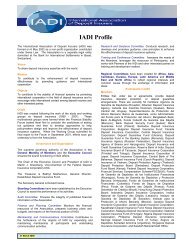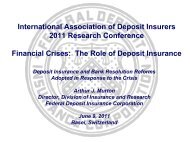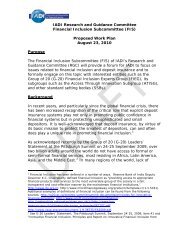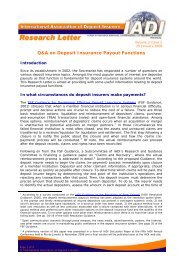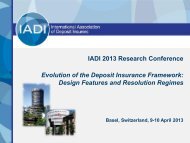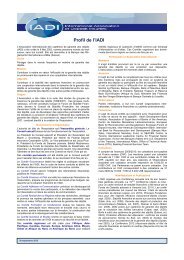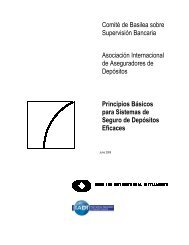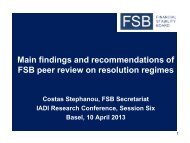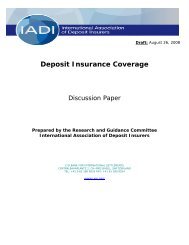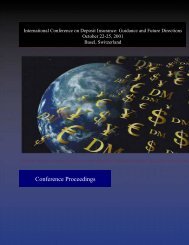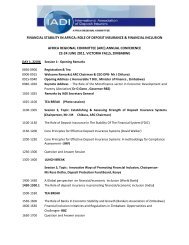Volume II - PDF - International Association of Deposit Insurers
Volume II - PDF - International Association of Deposit Insurers
Volume II - PDF - International Association of Deposit Insurers
- No tags were found...
You also want an ePaper? Increase the reach of your titles
YUMPU automatically turns print PDFs into web optimized ePapers that Google loves.
•BACKGROUND DOCUMENTS•<br />
Part I: Research<br />
mechanisms should be in place to ensure effective<br />
coordination by financial safety-net participants.<br />
The way a country grants membership in its deposit<br />
insurance system should be consistent with the<br />
country’s public-policy objectives and the deposit<br />
insurer’s mandate—whether paybox or riskminimisation.<br />
In all cases, appropriate mechanisms<br />
to encourage coordination and dialogue are necessary<br />
to ensure that the approval process transpires<br />
smoothly, and that eligible institutions meet minimum<br />
prudential standards and entry requirements.<br />
Should Institutions Reapply<br />
for Membership<br />
Generally, countries do not require member institutions<br />
to reapply for membership as long as they<br />
are subject to periodic or continuous examination<br />
by a regulatory or supervisory authority. Reapplication<br />
requires a significant commitment <strong>of</strong><br />
resources from the deposit insurer and may also<br />
create a certain amount <strong>of</strong> uncertainty regarding<br />
an institution’s operations. In any case, the application<br />
procedure should be consistent with a<br />
country’s regulatory or supervisory activities.<br />
Conclusions<br />
Membership requirements should be consistent<br />
with the deposit insurer’s public-policy objectives<br />
and mandate. Determining which institutions are<br />
allowed to join the system and the basis for their<br />
inclusion will have a significant effect on the effectiveness<br />
and overall risk pr<strong>of</strong>ile <strong>of</strong> the deposit<br />
insurance system.<br />
A deposit insurance system tends to work best<br />
when there are a large number <strong>of</strong> members to share<br />
risks and costs. It is generally agreed that deposittaking<br />
institutions benefit from the positive effects<br />
<strong>of</strong> a well-designed deposit insurance system and<br />
that adverse selection should be avoided. For these<br />
reasons, most deposit insurance systems require<br />
that membership be compulsory.<br />
Decisions must be made on which type <strong>of</strong> institution<br />
to include. Although country-specific issues<br />
will play a large role in these decisions, moralhazard<br />
concerns suggest that membership should<br />
be extended only to institutions that are subject to<br />
effective supervision and regulation.<br />
Generally, institutions must meet membership<br />
criteria and financial requirements in order to join<br />
the deposit insurance system. Whether a country’s<br />
public-policy objectives favour a paybox or a riskminimising<br />
system, experience shows that conditions<br />
<strong>of</strong> membership are required to make deposit<br />
insurance effective.<br />
Endnotes<br />
1 The Subgroup is comprised <strong>of</strong> representatives from<br />
Argentina (coordinator), Germany, Italy, and The<br />
World Bank.<br />
2 Whether a bank is considered to be domestic may<br />
depend on a number <strong>of</strong> factors including ownership,<br />
where the institution is licensed, and where the<br />
institution transacts most <strong>of</strong> its business.<br />
3 Foreign-bank branches and foreign-bank subsidiaries<br />
are different legal entities. A foreign-bank<br />
subsidiary is incorporated as a unique entity in the<br />
host country. A foreign-bank branch, on the other<br />
hand, is a direct extension <strong>of</strong> the foreign bank into a<br />
host country. Foreign-bank branches and foreignbank<br />
subsidiaries may be subject to different rules<br />
and supervised differently by a host country. The<br />
difference between a branch and a subsidiary relates<br />
primarily to the degree <strong>of</strong> “separateness” from the<br />
parent bank.<br />
4 This subject, as well as membership in the European<br />
Union, is covered in greater detail in the paper on<br />
cross-border issues.<br />
5 Countries considering the transition into the EU<br />
framework should consult the relevant directive.<br />
6 Other issues such as weak legal and regulatory or<br />
supervisory regimes and financial instability are<br />
dealt with in the papers on situational analysis and<br />
structure and organisation.<br />
44<br />
Guidance for Developing Effective <strong>Deposit</strong> Insurance Systems: <strong>Volume</strong> <strong>II</strong>



